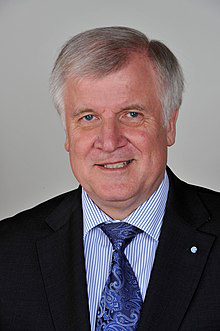

Minister of the Interior, Building and Community
Horst Lorenz Seehofer 4 July 1949 Ingolstadt, Bavaria, West Germany
-
Incumbent
German politician Horst SeehoferSeehofer in 2012Minister of the Interior, Building and CommunityIncumbentAssumed office 14 March 2018ChancellorAngela MerkelPreceded by Thomas de Maizière (Interior) Leader of the Christian Social UnionIn office 25 October 2008 – 19 January 2019General Secretary Karl-Theodor zu Guttenberg Alexander Dobrindt Andreas Scheuer Markus BlumePreceded by Erwin HuberSucceeded by Markus SöderActing Head of State of GermanyIn office 17 February 2012 – 18 March 2012ChancellorAngela MerkelPreceded by Christian WulffSucceeded by Joachim GauckPresident of the BundesratIn office 1 November 2011 – 31 October 2012Preceded by Hannelore KraftSucceeded by Winfried KretschmannMinister President of BavariaIn office 27 October 2008 – 13 March 2018DeputyMartin Zeil Ilse AignerPreceded by Günther BecksteinSucceeded by Ilse Aigner (Acting) Minister of Food, Agriculture and Consumer ProtectionIn office 22 November 2005 – 27 October 2008ChancellorAngela MerkelPreceded by Renate KünastSucceeded by Ilse AignerMinister of HealthIn office 6 May 1992 – 26 October 1998ChancellorHelmut KohlPreceded by Gerda HasselfeldtSucceeded by Andrea FischerMember of the Bundestag for IngolstadtIn office 4 November 1980 – 27 October 2008Preceded by Karl Heinz GierensteinSucceeded by Reinhard BrandlMember of the Landtag of Bavaria for Neuburg-SchrobenhausenIn office 7 October 2013 – 30 April 2018Preceded by Constituency establishedSucceeded by Matthias Enghuber Personal detailsBornHorst Lorenz Seehofer (1949-07-04 ) 4 July 1949 (age 72) Ingolstadt, Bavaria, West GermanyPolitical partyChristian Social UnionSpouse(s)Karin SeehoferChildren4SignatureWebsiteOfficial website Horst Lorenz Seehofer (born 4 July 1949) is a German politician serving as Minister of the Interior, Building and Community since 2018 under Chancellor Angela Merkel. A member of the Christian Social Union (CSU), he served as the 18th Minister President of Bavaria from 2008 to 2018 and Leader of the Christian Social Union in Bavaria from 2008 to 2019. First elected to the Bundestag in 1980, he served as Minister for Health and Social Security in the christian-liberal cabinets of Helmut Kohl from 1992 to 1998, going to the opposition afterwards and returning to the government as Minister of Food, Agriculture and Consumer Protection in the grand coalition cabinet of Angela Merkel from 2005 to 2008. Following a disastrous result for his party in the 2008 Bavarian state election, he became both Leader of the CSU and Minister President of Bavaria, an office he had never sought, after forming a coalition government with the liberal Free Democratic Party (FDP), the first coalition on state level in five decades. In 2013 he returned his party to an absolute majority on state level. He served as President of the Bundesrat from 2011 to 2012. As such he was Acting head of state of Germany from the resignation of President Christian Wulff on 17 February 2012 until the election of Joachim Gauck as Wulff's successor on 18 March 2012. A staunch opponent of Chancellor Angela Merkel's response to the 2010s migrant crisis, Seehofer threatened to file a formal complaint with the Constitutional Court, with the historic CDU/CSU alliance in danger of splitting and running against each other in the whole of Germany for the first time, but neither happened. He is a proponent of a federal cap on the number of refugees the German government is to take in. After faring historically badly in the 2017 federal election with a campaign that was criticised for mimicking the Alternative for Germany, the party receiving its worst result since 1949, and unsuccessfully trying to run for a third term as Minister President in 2018, he was pressured by his party to resign and instead decided to take the office of Minister of the Interior, Building and Community (originally intended for Joachim Herrmann) in Merkel's fourth government, in order to shape the migrant policy after his views. In July 2018, a week-long dissent between Seehofer and Merkel nearly brought down the government and again seriously threatened a CDU/CSU split, but they ultimately found a compromise.

We use cookies
We use cookies and other tracking technologies to improve your browsing experience on our website, to show you personalized content and targeted ads, to analyze our website traffic, and to understand where our visitors are coming from. Privacy Policy.